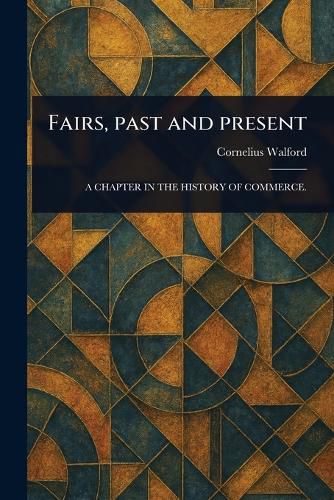Readings Newsletter
Become a Readings Member to make your shopping experience even easier.
Sign in or sign up for free!
You’re not far away from qualifying for FREE standard shipping within Australia
You’ve qualified for FREE standard shipping within Australia
The cart is loading…






This title is printed to order. This book may have been self-published. If so, we cannot guarantee the quality of the content. In the main most books will have gone through the editing process however some may not. We therefore suggest that you be aware of this before ordering this book. If in doubt check either the author or publisher’s details as we are unable to accept any returns unless they are faulty. Please contact us if you have any questions.
"Fairs, Past and Present: A Chapter in the History of Commerce" by Cornelius Walford delves into the fascinating world of fairs as vital engines of trade and commerce throughout history. This meticulously researched work explores the evolution of markets and fairs, examining their significant role in shaping economic landscapes. From local gatherings to large-scale international events, the book uncovers the historical importance of these centers of exchange.
Discover how fairs functioned not only as marketplaces but also as social and cultural hubs, reflecting the customs and traditions of their time. Walford's study provides invaluable insights into the development of trade networks and the broader historical context in which they flourished. A classic exploration of a crucial element in the history of business and economics, this book offers a comprehensive look at the enduring legacy of fairs.
This work has been selected by scholars as being culturally important, and is part of the knowledge base of civilization as we know it.
This work is in the public domain in the United States of America, and possibly other nations. Within the United States, you may freely copy and distribute this work, as no entity (individual or corporate) has a copyright on the body of the work.
Scholars believe, and we concur, that this work is important enough to be preserved, reproduced, and made generally available to the public. We appreciate your support of the preservation process, and thank you for being an important part of keeping this knowledge alive and relevant.
$9.00 standard shipping within Australia
FREE standard shipping within Australia for orders over $100.00
Express & International shipping calculated at checkout
This title is printed to order. This book may have been self-published. If so, we cannot guarantee the quality of the content. In the main most books will have gone through the editing process however some may not. We therefore suggest that you be aware of this before ordering this book. If in doubt check either the author or publisher’s details as we are unable to accept any returns unless they are faulty. Please contact us if you have any questions.
"Fairs, Past and Present: A Chapter in the History of Commerce" by Cornelius Walford delves into the fascinating world of fairs as vital engines of trade and commerce throughout history. This meticulously researched work explores the evolution of markets and fairs, examining their significant role in shaping economic landscapes. From local gatherings to large-scale international events, the book uncovers the historical importance of these centers of exchange.
Discover how fairs functioned not only as marketplaces but also as social and cultural hubs, reflecting the customs and traditions of their time. Walford's study provides invaluable insights into the development of trade networks and the broader historical context in which they flourished. A classic exploration of a crucial element in the history of business and economics, this book offers a comprehensive look at the enduring legacy of fairs.
This work has been selected by scholars as being culturally important, and is part of the knowledge base of civilization as we know it.
This work is in the public domain in the United States of America, and possibly other nations. Within the United States, you may freely copy and distribute this work, as no entity (individual or corporate) has a copyright on the body of the work.
Scholars believe, and we concur, that this work is important enough to be preserved, reproduced, and made generally available to the public. We appreciate your support of the preservation process, and thank you for being an important part of keeping this knowledge alive and relevant.